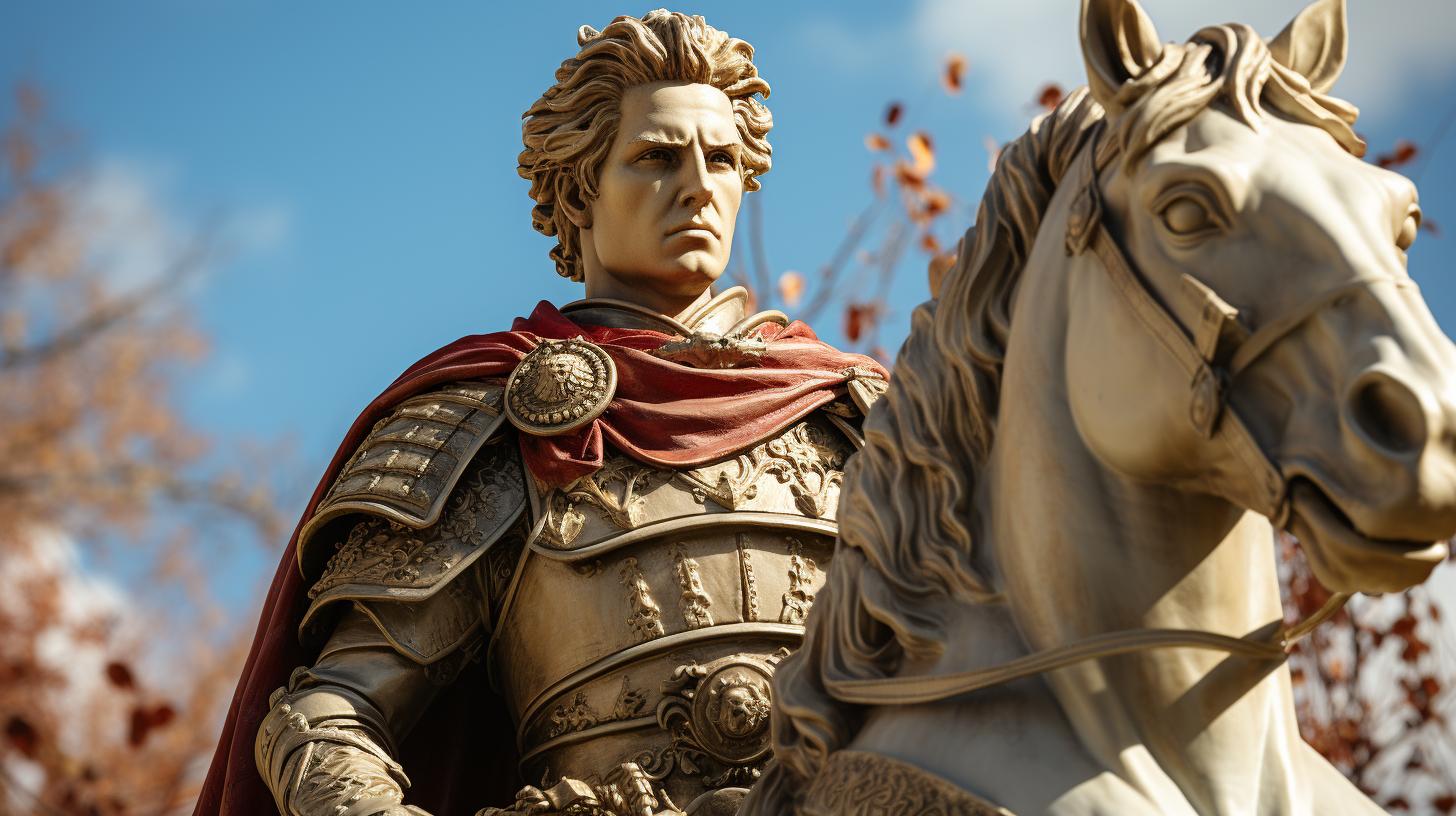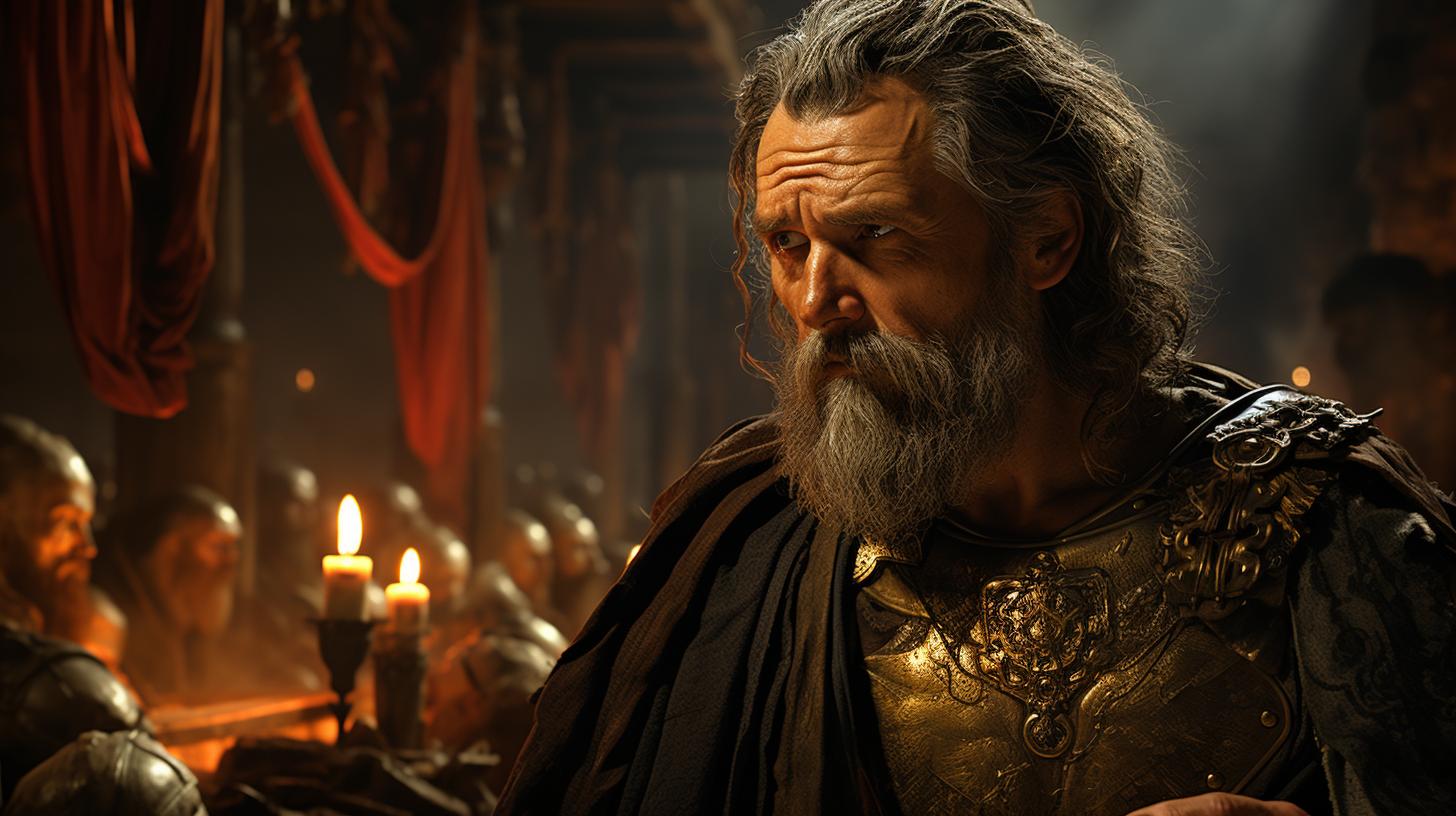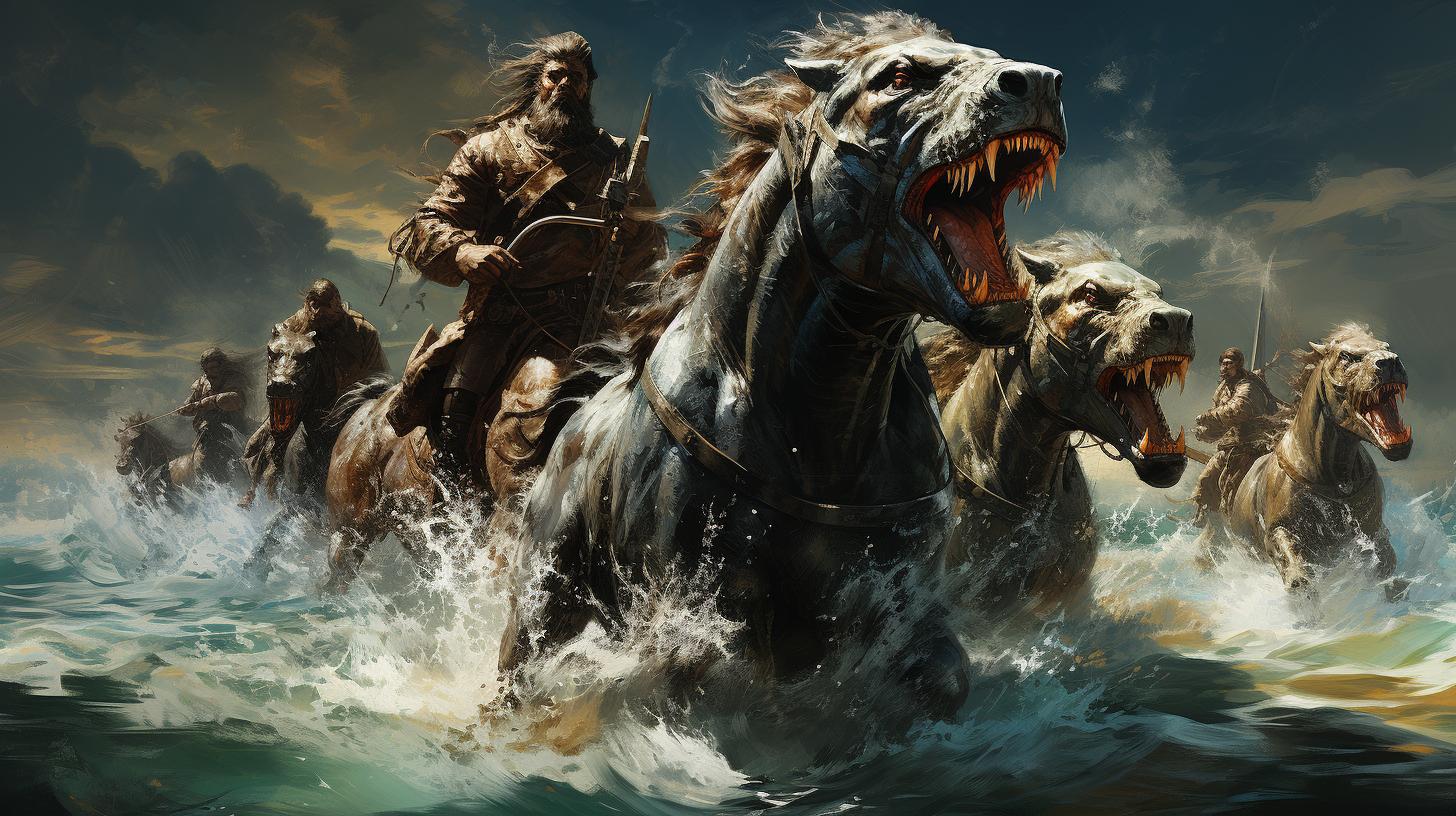Who Was Alexander the Great in Greek Mythology: A Historical Perspective

Alexander the Great, a renowned Greek king, played a significant role in reshaping the ancient world. Born in 356 BC in Macedonia, he ascended to the throne at 20 after his father’s assassination.
With titles like Pharaoh of Egypt and King of Persia, Alexander conducted successful military campaigns and triumphed over King Darius III of Persia. He established cities throughout his empire, including Alexandria.
Despite uncertainties surrounding his death, Alexander’s remarkable legacy continues to inspire and his military tactics remain studied worldwide.
Early Life and Rise to the Throne
Alexander the Great’s early life and rise to the throne played a crucial role in shaping his destiny as one of the most renowned Greek kings in history.
Birth and Background
Alexander, born in 356 BC in Pella, the ancient capital city of Macedonia, was the son of King Philip II.
His birth marked the beginning of a life filled with great ambition and potential.
From a young age, Alexander was exposed to the culture and traditions of Macedonia, which laid the foundation for his future endeavors.
The influence of his father, a skilled military strategist, instilled in Alexander a deep admiration for the art of warfare.
Ascension and Elimination of Contenders
At the age of 20, Alexander’s life took a dramatic turn as he ascended to the throne of Macedonia following the assassination of his father. Determined to secure his position and eliminate any potential threats, Alexander swiftly dealt with the contenders vying for the throne.
Although the elimination of contenders proved necessary for Alexander’s reign, it symbolized the beginning of his ruthless determination and unwavering pursuit of power. This decisive action would lay the groundwork for his future conquests and legacy.
Conquests and Titles
Pharaoh of Egypt
One of Alexander’s notable conquests was his ascension as the Pharaoh of Egypt. With his military prowess and strategic planning, he conquered Egypt in 332 BC, ending the Persian rule. As the Pharaoh, he aimed to unite the Egyptian people under his leadership, adopting their culture and worshipping their gods.
King of Persia
Alexander’s conquest of Persia marked a significant turning point in his career. By defeating King Darius III in 331 BC, he claimed the title of King of Persia. His victory was a testament to his tactical brilliance and the loyalty of his forces.
As the new ruler, he aimed to establish a harmonious blend of Greek and Persian culture, known as Hellenistic culture.
King of Asia
Building upon his victories, Alexander expanded his empire and earned the title of King of Asia. Through his military campaigns and relentless determination, he conquered vast territories, from the eastern borders of Europe to the Indus River in the east.
His ambition to conquer the entire known world led him to push the boundaries of his empire and establish his dominance over diverse lands and peoples.
Education and Influences
Education played a crucial role in shaping Alexander the Great’s remarkable journey. Under the tutelage of the esteemed philosopher Aristotle, Alexander received a comprehensive education that encompassed a wide range of subjects.
This educational foundation would prove instrumental in his future conquests and leadership.
Education under Aristotle
Alexander’s education under Aristotle was a significant factor in his development as a military and political leader. Aristotle imparted his profound knowledge of various disciplines, including philosophy, science, and literature. The teachings of Aristotle instilled in Alexander a thirst for learning, critical thinking skills, and an appreciation for the arts.
Through Aristotle’s guidance, Alexander gained insights into subjects such as ethics, politics, and natural philosophy. These teachings provided him with a well-rounded education and contributed to his ability to make informed decisions and exercise strategic thinking throughout his life.
Impact of Philosophy and Learning
Alexander’s exposure to philosophical ideas profoundly influenced his worldview and approach to governance. Drawing from the works of philosophers like Plato and Aristotle, he embraced concepts of justice, virtue, and the ideal governance of society.
This philosophical foundation fueled Alexander’s ambition to create a culturally diverse and enlightened empire.
Additionally, Alexander’s education fostered a deep appreciation for Greek culture, which he sought to spread throughout the lands he conquered.
The influence of Greek language, literature, and art served as a vehicle for cultural exchange and laid the groundwork for the Hellenistic era that followed in the wake of Alexander’s empire.
Furthermore, Alexander’s exposure to different cultures during his military campaigns allowed him to integrate and adopt elements of Persian, Egyptian, and other Eastern civilizations into his own empire. This cultural fusion left a lasting legacy on the regions he conquered, shaping future interactions between East and West.
Overall, Alexander the Great’s education under Aristotle and his exposure to various forms of learning and philosophy played a pivotal role in his development as a leader and his endeavors to transform the ancient world through conquest and cultural integration.
Military Campaigns and Victories
Throughout his reign, Alexander the Great led his army through numerous military campaigns and achieved remarkable victories, solidifying his position as one of the greatest military commanders in history. His conquests reshaped the ancient world and left a lasting impact on both Greek and Persian histories.
Conquering the Persian Empire
One of Alexander’s most significant achievements was the conquest of the Persian Empire. Upon assuming the throne, he directed the Greek army to fulfill his father’s ambition and wage war against the mighty Persian forces.
With strategic brilliance and relentless determination, Alexander shattered the Persian forces in a series of decisive battles.
Battle of Gaugamela
The Battle of Gaugamela stands as one of Alexander’s most celebrated victories and a turning point in his campaign against the Persians. In 331 BC, Alexander’s army faced King Darius III’s forces on the plains of Gaugamela, located in what is now northern Iraq.
Despite being heavily outnumbered, Alexander skillfully deployed his forces and executed a daring tactical maneuver, known as the “hammer and anvil.” The Macedonian phalanx held the center, while the cavalry flanked and enveloped the Persians, leading to a decisive Greek triumph.
Venture into India
Driven by his insatiable thirst for conquest and the belief that India marked the edge of the Earth, Alexander led his army eastward into the Indian subcontinent. The Indian campaign proved challenging, with fierce resistance from local kingdoms and the formidable natural terrain.
Though faced with heavy casualties and exhausted troops, Alexander advanced deep into India, expanding his empire.
Challenges and Retreat
As Alexander pushed further into India, his army was met with increasingly fierce opposition. The Indian kingdoms, led by King Porus, displayed formidable military prowess and courage. Despite prevailing in initial battles, Alexander’s troops faced growing exhaustion and dwindling supplies.
In the face of these challenges, Alexander made the difficult decision to retreat, ultimately preventing the complete collapse of his forces.
Throughout his military campaigns, Alexander’s strategic genius and unwavering determination were instrumental in his triumphs.
His conquest of the Persian Empire and his bold venture into India remain testament to his remarkable military prowess and relentless pursuit of expansion.
Establishing Cities and Empire
After his successful conquests, Alexander the Great focused on expanding his empire and establishing cities throughout the ancient world. This section explores his efforts in creating Alexandria and the vast empire he built.
Creation of Alexandria
One of Alexander’s most notable achievements was the founding of Alexandria, named after himself, which became a major cultural and economic center in Egypt. Situated along the Mediterranean coast, the city thrived as a hub for trade and intellectual pursuits.
Its famous library, the Library of Alexandria, housed countless volumes of knowledge, attracting scholars and thinkers from all over the world.
Spanning the Vast Empire
Alexander’s empire stretched across vast territories, covering more than 20 million square miles. As he conquered various regions, he established numerous cities throughout his dominion, each bearing the name Alexandria. These cities served as strategic outposts, facilitating governance, trade, and cultural diffusion.
- Alexandria Eschate in Central Asia guarded his eastern flank, ensuring control over the vast territories.
- Alexandria Bucephala near the Hydaspes River in ancient India honored his beloved horse Bucephalus.
- Alexandria Troas in Asia Minor became an important port city connecting Europe and Asia.
These and many other Alexandrias not only secured his territorial holdings but also served as symbols of his authority and influence.
Alexander’s vision extended beyond politics, as he aimed to promote Hellenistic culture and integrate diverse cultures and traditions into his empire. He encouraged the blending of Greek and local customs, fostering a rich cultural exchange that influenced the ancient world for centuries to come.
Alexander the Great’s establishment of cities and expansion of his empire left a lasting impact on the regions he conquered. The legacy of his cities and his dedication to cultural integration continue to fascinate historians and shape our understanding of ancient civilizations.
Personal Life and Legacy
Personal Life and Legacy section explores the private life and lasting influence of Alexander the Great. It delves into his marriages, heirs, as well as his mysterious death and the controversies surrounding it.
Marriages and Heirs
Alexander the Great took on three wives throughout his life. His first wife was Roxana, whom he deeply loved. Later, he married two Persian princesses, Stateira and Parysatis, for political alliances and to solidify his rule over conquered territories.
Though historical records are uncertain, it is believed that Alexander had two sons who were considered his heirs. These sons were Alexander IV of Macedon, born to Roxana, and Heracles of Macedon, born to Barsine, one of his concubines.
The future of his empire and the succession of his sons became a complex issue after his death.
Mysterious Death and Controversies
The exact cause of Alexander the Great’s death in 323 BC still remains disputed among historians. Various theories have been proposed, including poisoning, typhoid fever, or malaria. However, due to the lack of conclusive evidence, the exact circumstances of his demise remain a mystery.
Following his death, a power struggle ensued among his generals, leading to the fragmentation of his vast empire. The Diadochi, as they were known, fought for control and divided the conquered territories among themselves.
This period marked the beginning of the Hellenistic era.
Alexander’s legacy reverberates through history. His military strategies, administrative reforms, and cultural influence left an indelible mark on the ancient world. His awe-inspiring achievements continue to captivate and inspire scholars and military strategists even in modern times.
Influence and Historical Significance
Alexander the Great’s influence and historical significance cannot be overstated. His military conquests and empire-building efforts had a profound impact on the ancient world and subsequent civilizations.
1. Spread of Greek Culture: Through his conquests, Alexander spread Greek culture, language, and customs throughout the territories he conquered.
This Hellenistic influence played a crucial role in the development of art, architecture, literature, philosophy, and science in the regions under his rule.
2. Political and Administrative Reforms: Alexander introduced significant political and administrative reforms in the conquered territories.
He employed a policy of integration rather than dominance, allowing local rulers to retain power while establishing Greek cities and promoting intermingling of cultures. This approach set the foundation for later empires and multicultural societies.
3. Military Tactics and Strategy: Alexander’s military tactics and strategy revolutionized warfare. His innovative use of combined arms, rapid mobility, and strategic maneuvering proved highly effective on the battlefield. Military academies today continue to study and analyze his tactical genius.
4. Legacy of Empire: Alexander’s empire, despite its short-lived existence after his death, served as a bridge between the Eastern and Western worlds. It laid the groundwork for the spread of later empires, such as the Roman Empire, which inherited many administrative and cultural practices from Alexander’s conquests.
5. Inspiration for Future Leaders: Alexander’s courage, leadership, and determination continue to inspire leaders and military commanders. His ability to motivate and lead his troops through challenging circumstances has become legendary, making him a role model for generations to come.
6. Historical Interpretations: The life and legacy of Alexander the Great have been interpreted and reinterpreted by historians and scholars across the centuries. Numerous books, films, and scholarly works continue to explore his life, conquests, and impact, stimulating further research and ensuring that his story remains an essential part of human history.
Alexander the Great’s influence and historical significance endure as a testament to his remarkable achievements and the lasting imprint he left on the ancient world.




















